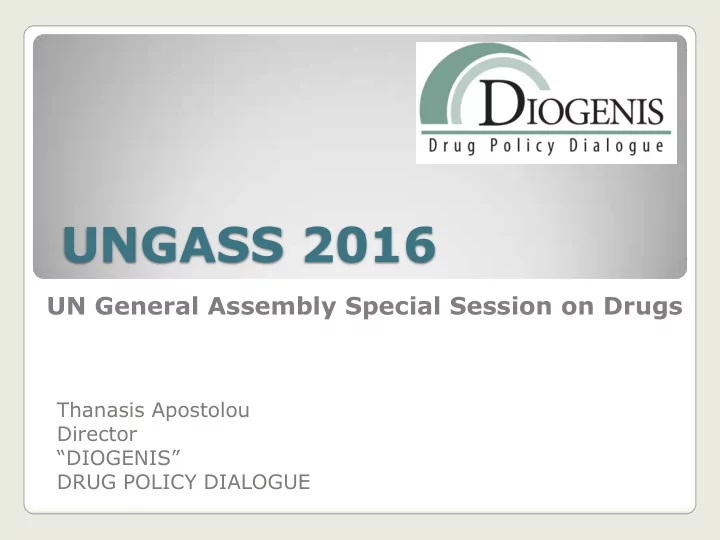

UNGASS 2016 UN General Assembly Special Session on Drugs Thanasis Apostolou Director “DIOGENIS” DRUG POLICY DIALOGUE
“ This issue requires a long-term multi- disciplinary approach (…) We must also listen to civil society, parliamentarians, youth, women and affected communities (…) We must look at new approaches and reflect on our past policies” H.E. Mr. Mogens Lykketoft UNGASS President
“ Global drug policy must put people first. We must emphasize the health and wellbeing of humankind, and this is what the drug control regulations are there for” Mr. Yury Fedotov Executive Director UNODC
“ Let me stress that the conventions never called for a war on drugs (…) There is no treaty obligation to incarcerate for minor offences such as possession of small quantities for personal use (…) inhumane punishments and treatment of users is not Mr. Werner Sipp in line with the conventions” INCB President
The International Drug Control Conventions The Single Convention on Narcotic Drugs of 1. 1961 Convention on Psychotropic Substances of 2. 1971 Convention against Illicit Traffic in Narcotic 3. Drugs and Psychotropic Substances of 1988 The aim was to: Ensure the availability of and accessibility to psychoactive substances for medical and scientific purposes while preventing their diversion to illicit channels and protecting the health and welfare of mankind
UNGASS 2016 Objective To review the progress regarding the implementation of the Political Declaration and Action Plan of International Cooperation towards an integrated and balanced approach in addressing the world drug problem, including the evaluation of the existing achievements and challenges , within the framework of the three International Drug Control Conventions and other relevant tools of the United Nations
UNGASS 2016 Expectations: an opportunity for change? OPPORTUNITY Honest and sincere assessment of the current drug policies Progress – Setbacks Success – Failure Challenges – Barriers CHANGE Public Health and Human rights ≠ Repression and Punishment
UNGASS 2016 Outcome Document “Our joint commitment to effectively addressing and countering the world drug problem”
UNGASS 2016 Positive points Given priority to people and public health “ People should be at the core of international and national drug policies” Drug dependence is recognized as a health matter “Recognize drug dependence as a complex, multifactorial health disorder characterized by a chronic and relapsing nature with social causes and consequences that can be prevented and treated through, inter alia, effective scientific evidence-based drug treatment, care and rehabilitation programmes ” Adoption of alternative to imprisonment measures and proportionality of sentencing
UNGASS 2016 Positive points Harm Reduction interventions are recognized “Invite relevant national authorities to consider (…) effective measures aimed at minimizing the adverse public health and social consequences of drug abuse, including appropriate medication-assisted therapy programmes, injecting equipment programmes, as well as antiretroviral therapy and other relevant interventions that prevent the transmission of HIV, viral hepatitis and other blood-borne diseases associated with drug use, as well as consider ensuring access to such interventions including in treatment and outreach services, prisons and other custodial settings”
UNGASS 2016 Positive points Availability of and access to controlled substances for medical and scientific purposes Encourage the voluntary participation of individuals with drug use disorders in treatment programmes, with informed consent Promote the development of targeted intervention taking into account the specific needs of different groups (e.g. gender, age) The role of Civil Society gains growing recognition Enhance cooperation in local, national and international level aimed at experience and best practices exchange
UNGASS 2016 Negative points No consensus between Member-States No reference regarding the abolition of death penalty for drug-related offences The term „Harm Reduction‟ is avoided Grey zone on the issue of drug consumption rooms No reference regarding the decriminalization of personal use The outdated International Conventions are still described as the “cornerstone” of the current drug policies
UNGASS 2016 Implications for future action How the positive points of the UNGASS 2016 can be translated into action for drug policy reform? Local level European level UN level
“All human beings are born free and equals in dignity and rights” (Article 1 of the Universal Declaration of Human Rights, United Nations, 1948) Show you support and use the hashtag at your social media #PWUDcount Persons Who Use Drugs count
Thank you! www.diogenis.info
Recommend
More recommend